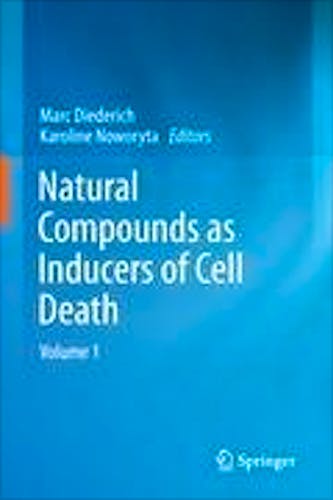

No hay productos en el carrito



Natural Compounds as Inducers of Cell Death, Vol. 1
Noworyta, K. — Diederich, M.
1ª Edición Octubre 2012
Inglés
Tapa dura
457 pags
1600 gr
null x null x null cm
ISBN 9789400745742
Editorial SPRINGER
Description
- Multi-disciplinary research fields
- Natural and dietary Products Bioactivity
- Anti-Cancer Research
- Cell Death Mechanisms
The content of this book gives a multi-disciplinary approach into the anti-cancer research field related to natural products and dietary compounds. Mainly, it covers the area of antitumor activity through an in-depth description of the cytotoxic, anti-inflammatory and anti-oxidant properties in cancer, inflammatory and cardio-vascular diseases. The cell death inducing mechanisms (apoptosis, anti-proliferative activity, angiogenesis, cell cycle control, cytostatic property and autophagy) give an overview of how natural products are able to target cancer cells.
Content Level » Research
Keywords » Anti-cancer activity Research - Biochemists - Natural Products Chemists - Phyto-chemistry
Related subjects » Biomedical Sciences
TABLE OF CONTENTS
Section 1, Phytochemicals as inducers of cell death mechanisms.-
- 1. Phytochemicals and Amino Acids: Inducers or Inhibitors of Cell Death?.-
- 2. Pomegranate-derived constituents as inducers of cell death: implications in cancer prevention and therapy.-
- 3. Antitumor effects of anthocyanins: focus on apoptosis.-
- 4. Anti-proliferative and apoptosis-inducing properties of Xanthohumol, a prenylated chalcone from hops (Humulus lupulus L.).-
- 5. Bioavailabitility and Metabolism of Curcuminoids.
Section 2, Natural compounds from animal origins.-
- 6. Melatonin in cell fate decisions: mechanistic perspectives and therapeutical potential.-
- 7. Pharmacologically active compounds from ticks and other arthropods and their potential use in anticancer therapy.
Section 3, Polyphenols as inducers of cell death.-
- 8. Induction of Apoptosis by Polyphenolic Compounds in Cancer Cells.-
- 9. Encapsulation of natural polyphenols with antioxidant properties in polyelectrolyte capsules and nanoparticles.-
- 10. Induction of Cell Death Occurring with Autophagy by Polyphenolic Compounds in Cancer.-
Section 4, Redox active natural compounds.-
- 11. Total antioxidant capacity: a useful tool in assessing antioxidant intake status.-
- 12. Natural sulfur products as redox modulators and selective inducers of cell death.-
- 13. Diallyl sulfides and the decision about life and death of a cell.-
Section 5, Effect of natural compounds on cell cell signaling pathways.-
- 14. Natural compounds as specific inhibitors of cyclin-dependent kinases — past, present and future.-
- 15. Plant-derived isoprenoids mediate regulation of mTOR signaling in tumor cells.-
- 16. Regulation of MicroRNAs by Natural Compounds: Implications for Cancer Therapy.-
Section 6, Phytochemicals in inflammation and cancer.-
- 17. Interference with estrogen receptor-α by dietary components: impact on the balance between cell proliferation and cell death.-
- 18. Natural Triterpenoids from Olive Oil: Potential Activities Against Cancer.-
- 19. Dietary sources of natural inducers of cell death: considerations for cancer therapy and prevention.-
Section 7, Phytochemicals in health and disease.-
- 20. Tocotrienols in the control of pathological fibroinflammatory processes.-
- 21. Anthocyanins: Janus nutraceuticals displaying chemotherapeutic and neuroprotective properties.-
- Index.
© 2026 Axón Librería S.L.
2.149.0